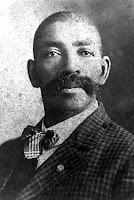The Cooking Gene: A Journey Through African American Culinary History in the Old South by Michael W. Twitty is another book I've owned for some time but didn't read. I was attracted, I'm sure, by the culinary history aspect. But now that my body is shot and I'm limited in what I eat, reading about food, itself, doesn't interest me as much as it used to. I've started following gluten free Facebook pages to give you an idea how my mind runs these days.
This book, though, isn't just about food.
Twitty is a food writer, culinary historian, independent historian, and historical interpreter. I'm not sure if he's a cook/chef, though he does cook as part of his work as a historical interpreter, demonstrating food cooked as slaves would have done it in the south. For my last unsold book, I did research on independent historians for one of the characters, and I am delighted to be able to point to The Cooking Gene as an example of the kind of work that historians who are not connected to an academic institution can produce.
And as a food writer, Twitty does very fine work, too. If he cooks a third as well as he writes, he must be very good with that, too.
What Twitty is doing with The Cooking Gene is using his family history to connect with the history of slaves in this country and tying it together with food. We get genealogy with this book, just as we did with Pearl's Secret, though Twitty has the benefit of DNA testing, which Neil Henry didn't have when he was doing his family research. Twitty did more than one DNA test and got dramatically more information than I got with the one Ancestry.com test I was willing to pay for. He also had a personal genealogist. Here's something you never hear: "If I win the lottery, I'm hiring a personal genealogist!" Just so you know, I'm saying it now.
Twitty travels to different parts of the south where his ancestors lived and writes about the different foods that were common there, as well as historical issues for each area. Once again, I'm supposed to know a little history. When I thought of crops in the old south, I thought of cotton. But it wasn't just cotton. It was tobacco (which I sort of knew about) and rice (which I didn't). As nasty crops to work with go, rice sounds the worst.
Twitty makes an interesting point about cotton: We think of cotton as having a huge impact on the enslavement of Blacks, but it did more. It had an impact on immigration in the north, because of all the cotton fabric mills that employed them. Evidently the so-called "Americans" who didn't want to work in the fields in the south, meaning we needed unpaid slaves, also didn't want to work in the mills in the north, so we needed underpaid immigrants. Which raises the question, what did "Americans" want to do?
The issue of immigration in the north connects with my people, because French Canadians came into this country in the nineteenth century to work in those mills Twitty mentions. But that's a story for another month.
While I was reading this book, I was acutely aware that Twitty was raised knowing a great deal more about Black cooking than I was raised knowing about French Canadian or even Franco American. But, again, that's for another piece of writing.
This was a great book to finish my Black History Month reading, since it relates to two of the other three books I read. As I said, it does some of what Neil Henry does in Pearl's Secret. But it also covers grim material like The Underground Railroad by Colson Whitehead. It's grimmer, in fact, because when Twitty writes about auction blocks and Black men and women being stripped so white shoppers can check them out, that was real. Readers can reassure themselves that The Underground Railroad is fiction. The Cooking Gene isn't.
I've had a good month of reading. Time to move on to Women's History.





